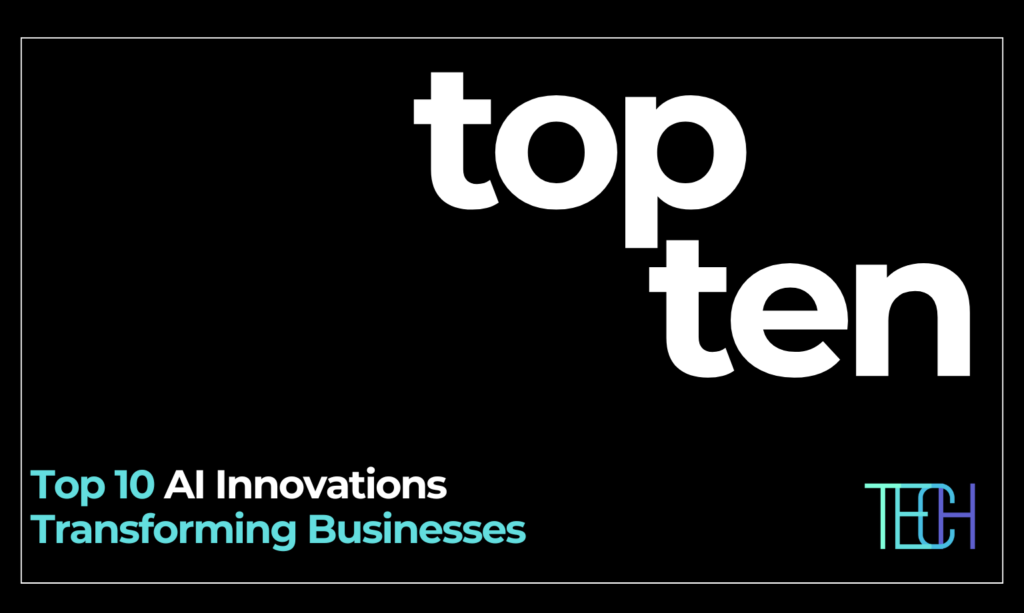Top 10 AI Innovations Transforming Businesses
Artificial Intelligence (AI) has rapidly evolved from a futuristic concept to a driving force in modern business. From automating mundane tasks to optimising decision-making and enhancing customer experiences, AI is revolutionising industries across the globe. Here are the top 10 AI innovations that are transforming businesses and shaping the future of work.
1. Generative AI
Generative AI refers to machine learning models capable of creating new content, such as text, images, music, and even videos, based on patterns in existing data. This innovation is disrupting industries like marketing, content creation, and entertainment. Tools like GPT-3 and DALL-E can automatically generate blog posts, design visuals, and even compose music, significantly reducing the time and cost of creative work.
Key Impact:
- Automates content creation
- Enhances creative processes
- Reduces costs in industries like marketing and design
2. AI-Powered Chatbots and Virtual Assistants
AI chatbots and virtual assistants are transforming customer service by automating interactions and offering 24/7 support. Using natural language processing (NLP) and machine learning, these bots can handle complex queries, offer personalised solutions, and improve response times. Companies like Zendesk, Drift, and Intercom have successfully integrated AI-powered assistants to improve customer engagement and reduce operational costs.
Key Impact:
- Improves customer experience
- Reduces customer service costs
- Offers scalable, round-the-clock support
3. Predictive Analytics
Predictive analytics uses AI to forecast future trends based on historical data. Businesses in sectors like retail, finance, healthcare, and manufacturing use AI-driven analytics tools to predict customer behaviour, demand patterns, and even potential risks. Solutions like IBM Watson Analytics and Google Cloud AI help companies make data-driven decisions, optimise inventory, and predict maintenance needs.
Key Impact:
- Optimises inventory and resource allocation
- Enhances risk management
- Supports data-driven decision-making
4. AI-Driven Personalisation
Personalisation engines powered by AI allow businesses to deliver hyper-targeted content and experiences to customers. By analysing customer preferences, behaviours, and historical interactions, AI can recommend products, services, and content tailored to each individual. Amazon and Netflix use AI to suggest products and shows based on previous browsing and viewing habits, driving sales and engagement.
Key Impact:
- Increases conversion rates
- Enhances customer loyalty
- Improves user engagement through personalised experiences
5. AI in Cybersecurity
AI is playing a pivotal role in enhancing cybersecurity by identifying and responding to potential threats in real-time. Machine learning algorithms can detect anomalies, flag unusual behaviour, and even predict potential breaches before they happen. Tools like Darktrace and Crowdstrike leverage AI to provide businesses with more advanced, automated, and proactive cybersecurity solutions.
Key Impact:
- Strengthens threat detection and response
- Minimises human error in security operations
- Improves data protection and privacy
6. Autonomous Vehicles and AI in Logistics
Self-driving vehicles and AI-powered logistics systems are revolutionising supply chains and delivery networks. Autonomous vehicles, drones, and robots are streamlining deliveries, reducing costs, and increasing efficiency in industries like retail, food delivery, and freight. Companies like Tesla, Amazon, and Waymo are leading the charge in integrating AI to optimise the movement of goods and reduce human labour costs.
Key Impact:
- Reduces delivery time and cost
- Enhances supply chain efficiency
- Opens new business models in logistics and transportation
7. AI in Human Resources (HR)
AI is transforming human resources by automating recruitment, performance management, and employee engagement. Tools like HireVue and Pymetrics use AI to screen CVs, assess candidate fit, and even conduct initial interview rounds. This helps companies find top talent faster, reduce bias in hiring, and improve overall workforce management.
Key Impact:
- Automates the recruitment process
- Enhances employee engagement and retention
- Reduces bias and improves hiring decisions
8. AI-Powered Healthcare Diagnostics
AI innovations in healthcare are driving faster, more accurate diagnoses, transforming how medical professionals detect and treat diseases. Machine learning models analyse medical imaging data, genetic information, and patient histories to assist in diagnosing conditions like cancer, heart disease, and neurological disorders. IBM Watson Health and Google Health are at the forefront, using AI to improve patient outcomes and reduce medical errors.
Key Impact:
- Speeds up diagnosis and treatment processes
- Improves accuracy in detecting diseases
- Reduces healthcare costs by streamlining processes
9. AI in Finance and Trading
In finance, AI is enabling smarter decision-making, automating tasks, and predicting market trends. AI-powered tools in wealth management, fraud detection, and algorithmic trading are helping businesses enhance financial services. Companies like Betterment and Robo-advisors are using AI to provide personalised investment advice, while banks leverage AI for credit scoring and fraud prevention.
Key Impact:
- Improves financial forecasting and risk management
- Automates trading and investment strategies
- Enhances fraud detection and prevention
10. AI in Manufacturing and Industry 4.0
AI is revolutionising manufacturing through the concept of Industry 4.0, where smart machines, robotics, and AI systems work together to optimise production lines, improve product quality, and reduce operational costs. AI-powered predictive maintenance, quality control, and supply chain management systems enable manufacturers to reduce downtime, increase throughput, and deliver higher-quality products faster.
Key Impact:
- Enhances efficiency and reduces downtime
- Optimises production and quality control
- Reduces operational costs and improves output
Conclusion:
AI is no longer just a buzzword but a tangible force that’s reshaping the business landscape. From automating mundane tasks to driving innovation in customer service, logistics, and healthcare, AI is enabling businesses to streamline operations, enhance customer experiences, and improve decision-making. As AI continues to evolve, its potential to transform industries is limitless, making it an essential tool for organisations seeking to stay ahead in a rapidly changing world.

